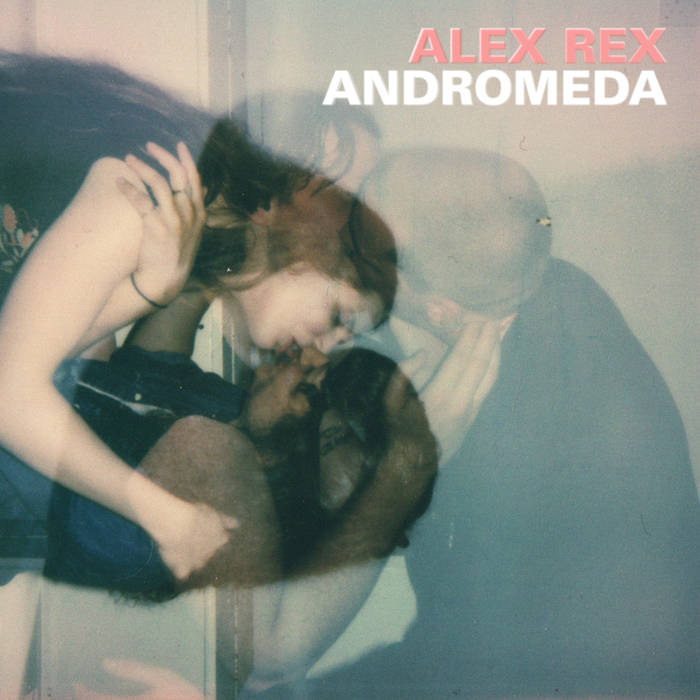Alex Rex is of course Alex Neilson – experimental drummer to innovative musicians such as Bonnie “Prince” Billy, Shirley Collins, Jandek and Current 93 – and chief writer of the much-missed folk-prog-rockers Trembling Bells. He released his second album, ‘Otterburn’, largely devoted to a younger brother who died tragically on his canal boat of that name, around this time last year.
Otterburn was a very personal record; intensely sad, disturbing, darkly and shamelessly humorous all at the same time and with some weird subject matter. Like dildos and what he described as “the aural equivalent of a Victorian medical device.”
By all accounts things haven’t got much better for him over the last year or so. ‘Andromeda’ is the product of “two years spent in therapy, the gym and on Tinder,” and “a game of emotional snakes and ladders”.
The folk legend Shirley Collins is the first voice to be heard, rather than that of Nielson, on ‘Song of Self Doubt’, the mere title of which sets the tone for an album which includes tracks entitled ‘Funeral Music for Alex Rex’, ‘Oblivion’, ‘Rottweilers’, ‘The Uses of Trauma’, and the oh-so pertinent ‘Pass the Mask’. Oh, and one called ‘I am happy’ which looks like it escaped from another album.
“I waited for you all day amongst the ruins in the abandoned castle in my body” Shirley intones, in a piece of prose that could have been voiced by Pam Ayres, to a backdrop of birdsong. Then, “I called the flower Alexander and trampled it/Then turned, hunched against the wind/and barrelled into the wilderness/Never seen again.” We’re not exactly here for a laugh.
“I kept and ate the handful of hair you gave me; alchemy for the painfully alone” Alex sings on the next track, in a slow sinister ballad which appears again to reference Alastair’s death, and which gets darker as it goes. “But do you remember… that phone call from my father on that April day/That shattered my London dream?” There are also a wonderful couple of lines that everyone can relate to. “Hoping all the while for time to harden me/’Cos nothing heals or fucks you harder than time”.
‘I am happy’ hasn’t actually escaped from anywhere. An insistent, almost pernicious non-stop assault on the senses it takes on a semblance of The Darkness’ ‘Christmas Time (Don’t let the Bells end’) in the latter part (a band whose own front man went through therapy of course). “Still I am happy” he sings, ‘Laughing alone again’.
‘Funeral Music for Alex Rex’ is a remarkable piece of work, a soliloquy which is an early contender for Track of the Year. To a subliminal tune which lies somewhere between a medieval funeral march and Scott Fitzgerald/Yvonne Keeley’s ‘If I had words’ it builds to a crescendo with more fabulous lyrics: “And I regret not seeing the view/From the Sacré Cœur/or the centre of the earth/as we drank and fucked away our self-worth”. And, as odd an analogy as it may appear to be, the final section, in which a narrator (Steve Jackson) takes over, is eerily reminiscent of Nightwish’s ‘The Poet & the Pendulum’ in which a disembodied voice narrates the attempted suicide of the writer. Pure theatre.
After that, any song has to be an anticlimax, and ‘Oblivion’, a song more in the style of ‘Otterburn’ and in which he dictates his own suicide note, is. But only because of the magnificence of what preceded it.
‘Coward’s Song’ is a slow, drawn-out lament which employs lines from Richard III, who would be king no matter what. It isn’t clear if he (Neilson) genuinely believes in his own greatness but London doesn’t come out of it very well. You can take the boy out of Leeds, but not Leeds out of the boy.
The considerably more up-tempo ‘Rottweilers’, and the only song thus far to feature an instrumental break, continues this theme of destructive self-deception, the slavering muscular animal gnawing at his rational mind. “Please write down the terrible deeds/of beautiful men who come from Leeds” he wails.
More self-introspection follows in ‘Alibi Blues,’ the opening lines confirming that he sees no end to his travails in the immediate future.
“So I’m building a fence around paradise/to harvest my misanthropy/I am both the tree and the axe/And the reason I’m swinging is me”.
A depressing notion but one alleviated by the presence of more instrumental backing than previously including some seriously industrial guitar.
‘Haunted House’ was the first single off the album and is a ghost-rock ballad about an emotional poltergeist looking for love.
“Your mouth is a haunted house/Children make up stories about/To scare the living hell out of each other/I used to haunt it myself when I was your lover”.
It was originally written as a Trembling Bells song but they stopped ringing before it was finished. The female backing vocal is by Jill Lorean from Glaswegian three-piece Sparrow and the Workshop. I sense that it could be extended into fuller piece, an album, or even a rock opera.
‘The uses of trauma’ is an imagery-replete litany, again partly voiced by Jill Lorean (“A terrible bird/with black and gold feathers/galaxies are his eyes”… “I emerged from the mountain/chained to a tiger/famished of love/nourished in anger/drowning in love“) which appears to catalogue the ways he dealt with, or didn’t deal with, his brother’s death.
‘I’m Not Hurting No More’ is one of the more unusual songs you’ll hear this year, spoken rather than sung and competing with what sounds like a construction site piling machine until that chain-saw like guitar returns towards the end. It could be the bastard child of a liaison between John Cooper Clarke and Lemn Sissay as it strolls surreally around the Smoke, the narrator being ”fucked like he’s nothing” (presumably metaphorically) in a 550-word monologue.
The final track, ‘Pass the mask’ is about the anxiety of childbearing by someone who has never borne a child. The opening verse is priceless… “O my son, how do I begin to tell you all the things I have done?/and if I did would you be disappointed?/But you get used to living with disappointment/Look at me and your mum.”
Is Neilson speaking of himself here? Is that how he sees himself, as a failure? Especially when compared to his brother, who is mentioned in half of the songs on the album? Is this some sort of cathartic journey he has embroiled us in, which may or may not cure him? After all, an earlier line returns to conclude the album – “Nothing can heal or destroy you better than time.” The story continues.
If your idea of fun is reading some Edgar Allan Poe then watching a ‘The League of Gentlemen’ episode (possibly one with a sketch involving the cannibal butcher, Hillary Briss) before settling down with a Stephen King audio book, you’ve hit pay dirt with this album. It’s dark, almost frightening at times and will test you. You’ll have to listen to it several times to even get the gist of its complex allusions and allegories. And what you’ll be listening to is poetry set to a little music (with the exception of the glorious ‘Funeral Music for Alex Rex’).
I’m starting to think in terms of a male Fiona Apple with Neilson. No-one bears her soul more openly than Apple but the subject matter is usually the raw deal she gets from partners. In Neilson’s case it’s the raw deal he’s had from life. And as he acknowledges, he’s just one of us, we’re all in the shit together.
Where does he go from here? A collaboration with someone like Polly Scattergood perhaps, the Queen of Ethereal and who has also chronicled her lost days in London, struggling to come to terms with personal traumas.
The guest appearances from Shirley Collins and Steve Jackson enhance contributions from musical collaborators including Rory Haye, Audrey Bizouerne (Rev Magnetic / Bill Wells) and Georgia Seddon (Mike Heron / The Incredible String Band).
‘Andromeda’ is released on 7th February, 2020.




